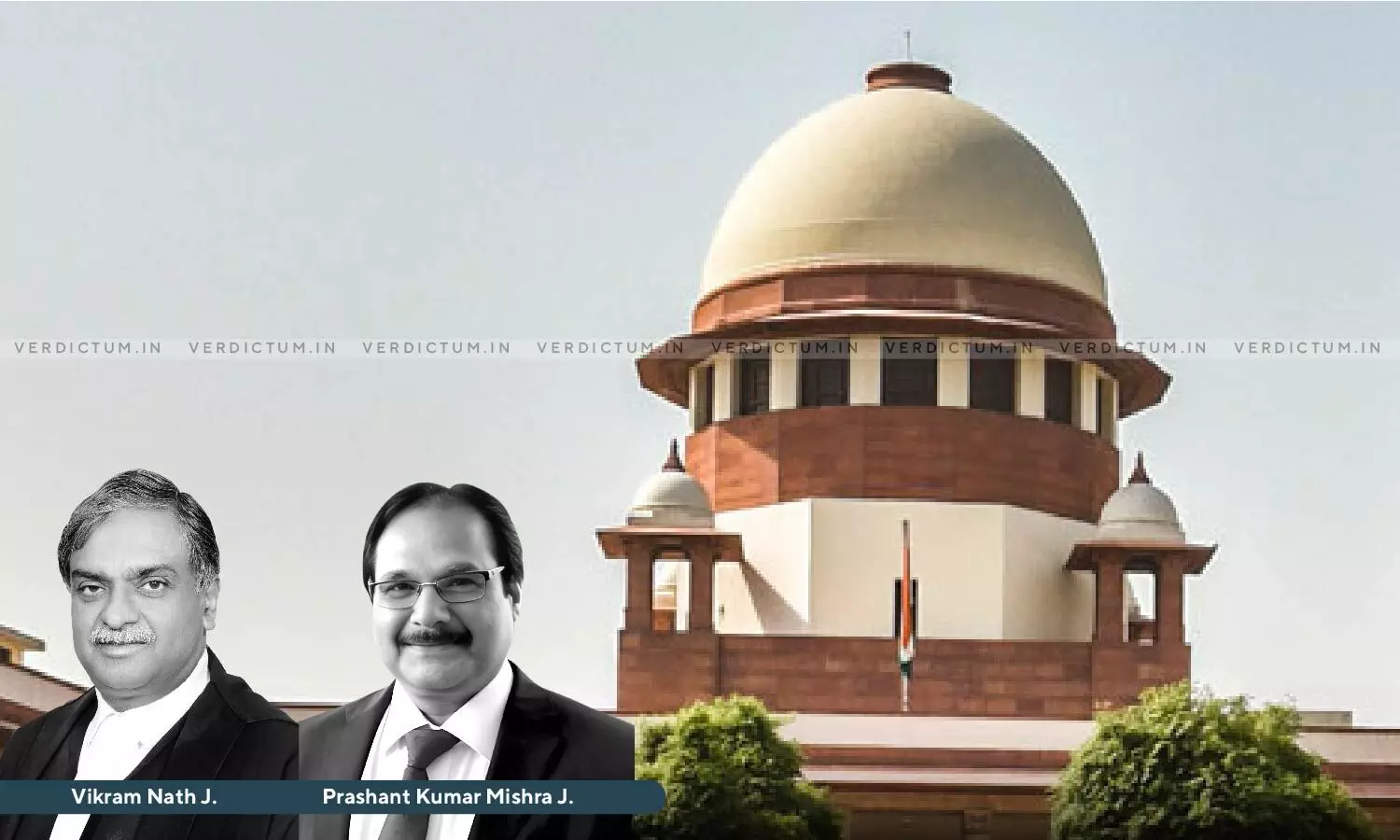
Mere Absence Of Explicit Boundary Details Of Property Does Not Render Agreement To Sell Vague Or Unenforceable: Supreme Court
 |
|The Supreme Court observed that mere absence of explicit boundary details of property does not render the agreement vague or unenforceable.
The Court observed thus in a batch of Civil Appeals preferred by the Plaintiffs in a Suit for Specific Performance of a Contract, challenging the Judgment of the High Court by which it set aside the Trial Court’s Order and dismissed the Suit.
The two-Judge Bench comprising Justice Vikram Nath and Justice Prashant Kumar Mishra held, “This Court held that a transferee pendente lite is bound by the outcome of the litigation and may be added as a party to the suit, especially if the transfer was made with knowledge of the pending proceedings and in violation of an injunction. In contrast, the present case revolves around the enforceability of the Agreement to Sell dated 30.08.1990, which sufficiently identifies the property through detailed descriptions, including khasra numbers, area, and location. The absence of explicit boundary details does not render the agreement vague or unenforceable, as the property can be clearly identified from the information provided.”
Senior Advocates P.S. Patwalia and Rahul Sripat appeared for the Appellants while Senior Advocates Sunil Kumar, Sudhanshu Shashikumr Choudhari, and Ardhendumauli Kumar Prasad appeared for the Respondents. AOR Shekhar Kumar appeared for the intervenor.
Brief Facts -
The dispute was related to Khasras purchased vide registered Sale Deed executed by erstwhile owner for a sale consideration of Rs. 7,000/- The Appellants filed separate Suits for Specific Performance in 1995 against the legal heirs of Sushila Devi. In the Plaint, the Defendants were the other legal heirs. Sushila was the owner of the Suit schedule property and she entered into an Agreement to Sell in 1990 with each of the Appellants separately after receiving the entire sale consideration. The Appellants had taken over actual possession, having paid the entire sale consideration, the Suit schedule property was agricultural land and cultivated by the Appellants.
The Defendants declined to fulfil their legal obligation by executing the Sale Deed in favour of the Appellants and had instead applied for mutation, which was allowed by the Revenue Authority. On filing the suits, the Trial Court passed an interim injunction order, putting a restraint on the alienation of the property in suit. Thereafter, the Trial Court decreed all the Suits and hence, Defendants filed an Appeal before the High Court. The High Court allowed the same, set aside the Trial Court’s Judgment, and dismissed the Suits. Being aggrieved, the Appellants approached the Apex Court.
The Supreme Court in view of the above facts, noted, “A purchaser who has paid the full consideration and received the original title deeds from the seller would have taken possession under normal circumstances. Any possession taken by any other party thereafter would be unauthorised and illegal.”
The Court added that the finding of the High Court regarding Plaintiff not being in possession and therefore the Suit being barred in law, is untenable. It further noted that the Plaintiffs have been in possession of the suit property since the execution of the Agreement to Sell, actively cultivating it and paying land revenue, which contradicts the Respondents' claim that possession remained with Sushila Devi and her heirs.
“Regarding the sale deeds executed during the pendency of the suit, while such transfers are not void ab initio, they are subject to the doctrine of lis pendens and cannot prejudice the plaintiffs' rights under the prior Agreement to Sell”, it said.
The Court also observed that, while the Respondents argue that the Sale Deeds are not void but subject to adjudication, the Doctrine of Lis Pendens ensures that such transfers cannot prejudice the Plaintiffs' prior contractual rights.
“… this Court held that when a party alleges fraud or that a transaction is benami, the onus is on that party to prove the allegation. The Court emphasized that the apparent tenor of a document is presumed to be true unless disproved by the party alleging otherwise. The burden does not shift to the party relying on the document to prove its validity beyond its face value”, it remarked.
The Court concluded that the subsequent purchasers and the intervenors, who had further purchased the property from third parties, will only get rights of their vendors and if the vendors did not have any rights, the vendees cannot be said to be in any better position.
Accordingly, the Apex Court allowed the Appeals, set aside the High Court’s Judgment, and restored that of the Trial Court.
Cause Title- Shyam Kumar Inani v. Vinod Agrawal & Ors. (Neutral Citation: 2024 INSC 865)
Appearance:
Appellants: Senior Advocates P.S. Patwalia, Rahul Sripat, AOR Yadav Narender Singh, Advocates Santosh Kumar, Madhurendra Sharma, Rajiv R. Mishra, and Suruchi Yadav.
Respondents: Senior Advocates Sunil Kumar, Sudhanshu Shashikumr Choudhari, Ardhendumauli Kumar Prasad, AORs Yugandhara Pawar Jha, Akshat Shrivastava, Divyakant Lahoti, Advocates Harshvardhan Jha, Srishti Mishra, Aman Pathak, Shuchi Bharti, Tunika Sharma, Satvic Mathur, Kumar Vinayakam Gupta, Praveena Bisht, Vindhya Mehra, Kartik Lahoti, Adith Menon, Samridhi Bhatt, Shreya Gokel, Anushka Awasthi, Rohan Thawani, Vandana Sehgal, and S. Ambica.
Intervenor: AOR Shekhar Kumar, Advocates Shree Prakash Sinha, Rakesh Mishra, Mohua Sinha, Nawalendra Kumar, Shwetam, Rishabh Kumar, and Anoop Kashyap.